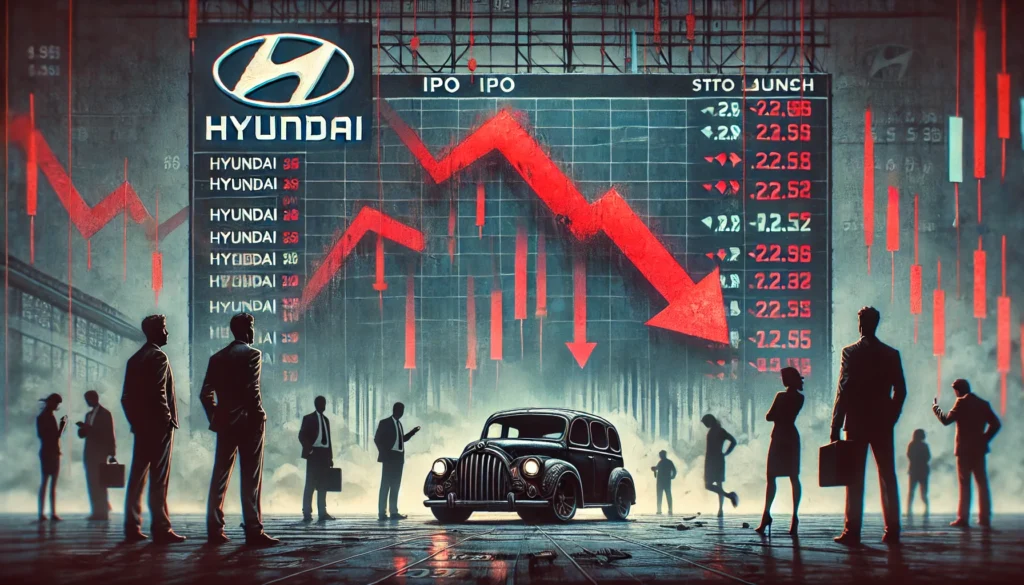
Hyundai’s ₹28,000 crore mega IPO, initially seen as a significant event for India’s automotive market, faced a lukewarm response from retail investors and failed to meet the hype. Several factors contributed to its underwhelming performance:
- High Valuations: Hyundai’s pricing was set at a premium, with its upper price band around ₹1,960 per share. This high valuation, about 26 times the FY24 earnings and 30 times the FY25 earnings, raised concerns among retail investors who deemed it overvalued, making them reluctant to participate. The IPO was seen as expensive, especially compared to similar companies in the sector.
- Offer-for-Sale (OFS) Structure: The IPO was structured entirely as an Offer for Sale (OFS), meaning that the proceeds would go to the parent company, Hyundai Motor Company, rather than into Hyundai Motor India. This raised red flags for potential investors, as the money raised wouldn’t be reinvested in the Indian business, which many investors saw as a missed opportunity for growth. This structure reduced retail interest significantly.
- Internal and External Competition: Hyundai faces tough competition from both within and outside its own group. While it competes with market leader Maruti Suzuki, its own affiliate, Kia Motors, has been performing strongly and capturing market share in India. Investors were concerned about internal competition between Hyundai and Kia, especially since Kia has been growing at a faster rate.
- Timing and Market Sentiment: The IPO launch coincided with a broader market correction, leading to a more cautious approach from investors. Moreover, there was a perception that the IPO might be more beneficial for Hyundai’s valuation in South Korea than for the Indian arm, which dampened enthusiasm among Indian investors.
Despite these challenges, the IPO did manage to attract significant interest from institutional investors, with the Qualified Institutional Buyers (QIB) segment being oversubscribed. However, retail and non-institutional investors largely stayed away, leading to an overall underperformance in terms of broader public participation.
This event highlights the complexities of global corporations raising funds in India, especially when the local market feels the terms are not aligned with its interests.
“Frequently Asked Questions (FAQs) Reasons for Failure of Hyundai IPO”
1. Why did Hyundai’s mega IPO flop?
Hyundai’s IPO struggled due to high valuation concerns, market volatility, and skepticism about its long-term growth prospects in the highly competitive automotive industry.
2. How much did Hyundai aim to raise through this IPO?
Hyundai aimed to raise approximately ₹28,000 crore through the IPO to fund expansion and reduce debt.
What were the primary reasons investors were hesitant?
Many investors were cautious due to Hyundai’s ambitious valuation, economic uncertainty, and global automotive sector challenges, including the shift towards EVs (electric vehicles).
4. How does this IPO flop impact Hyundai’s growth plans?
The setback may delay Hyundai’s expansion projects and force the company to explore alternative funding sources or reconsider its valuation and growth projections.
5. How does this impact Hyundai’s competitors?
This flop could influence other automotive companies, as it reflects investors’ cautious stance on traditional automakers, especially those transitioning to EV markets.
6. What does Hyundai’s IPO flop indicate about the current market?
It highlights market sensitivity to high valuations and the broader uncertainty in the automotive and EV sectors amidst economic fluctuations.
7. Did Hyundai’s IPO flop affect the stock market?
Yes, there was minor market movement, as Hyundai’s IPO flop added to concerns about mega-IPOs in volatile market conditions.
8. Were there similar IPO flops recently?
Yes, other companies in tech and automotive sectors have faced challenges with large IPOs recently, particularly if their valuation is seen as overestimated.
